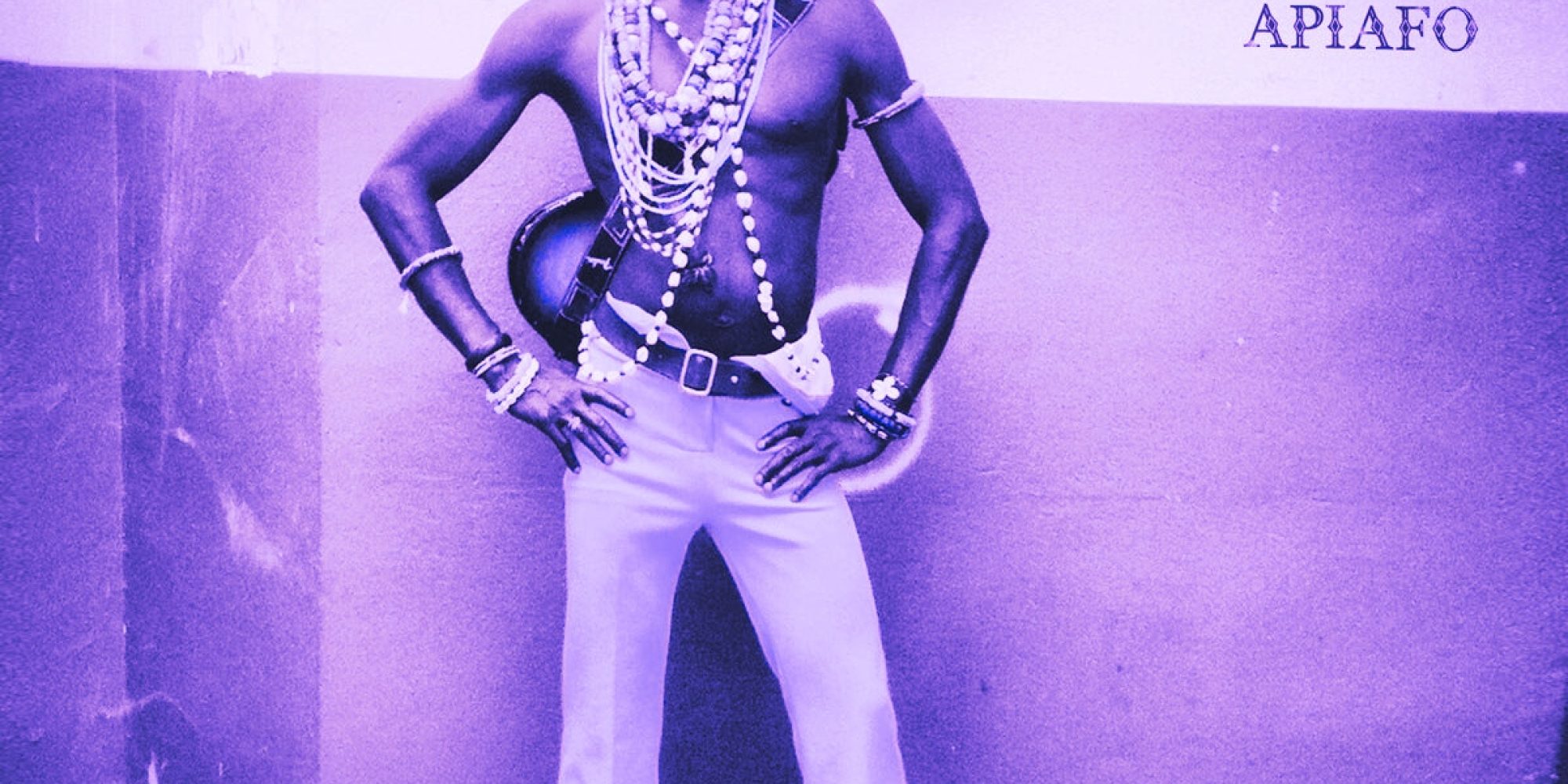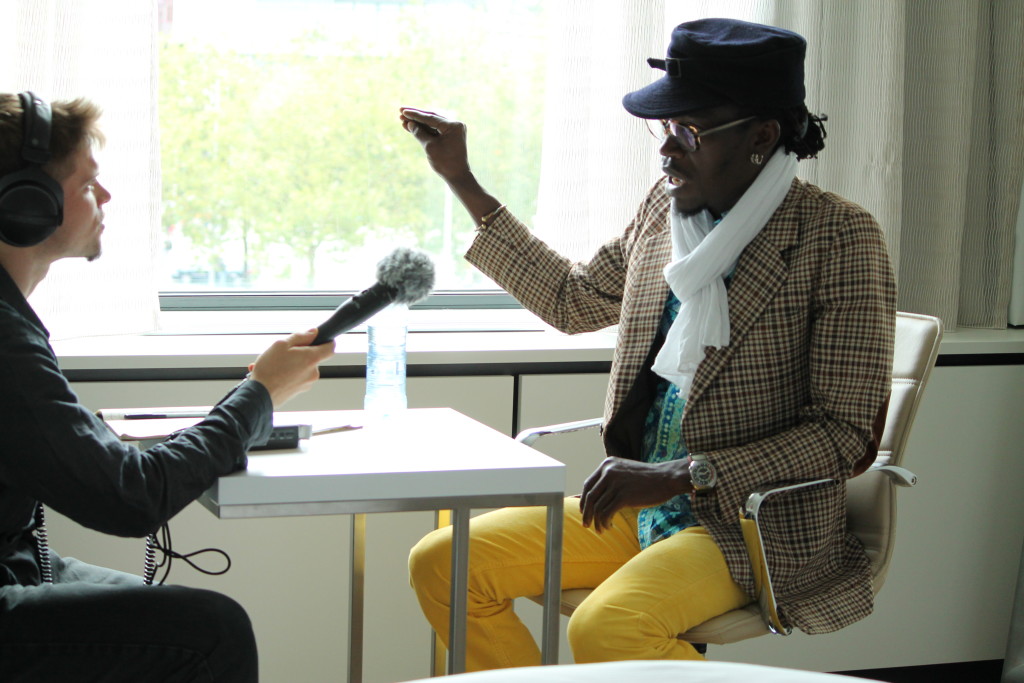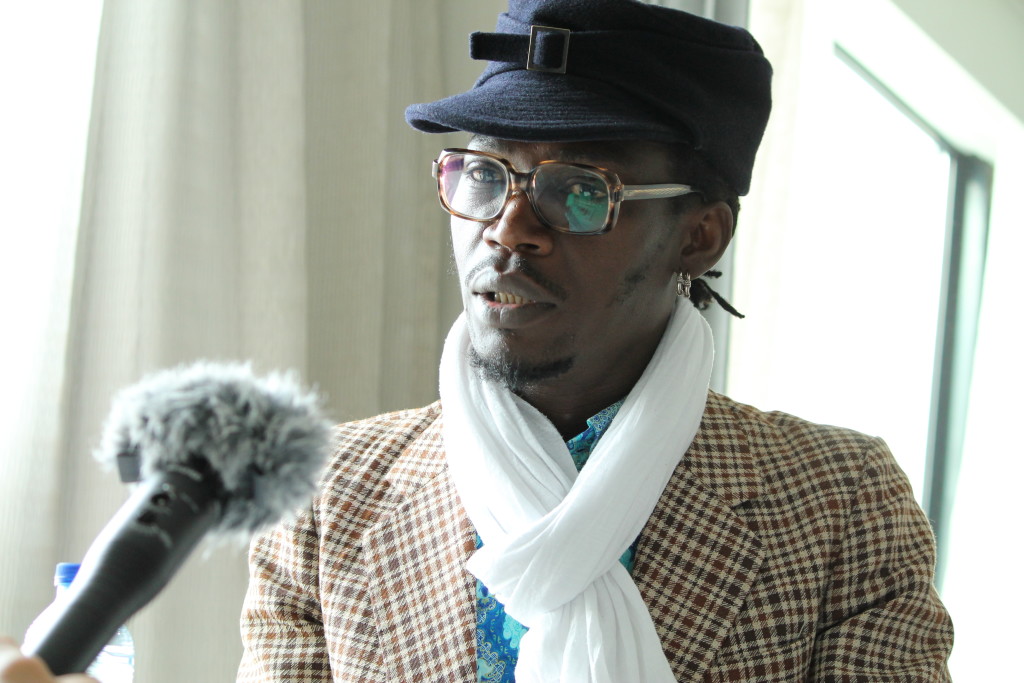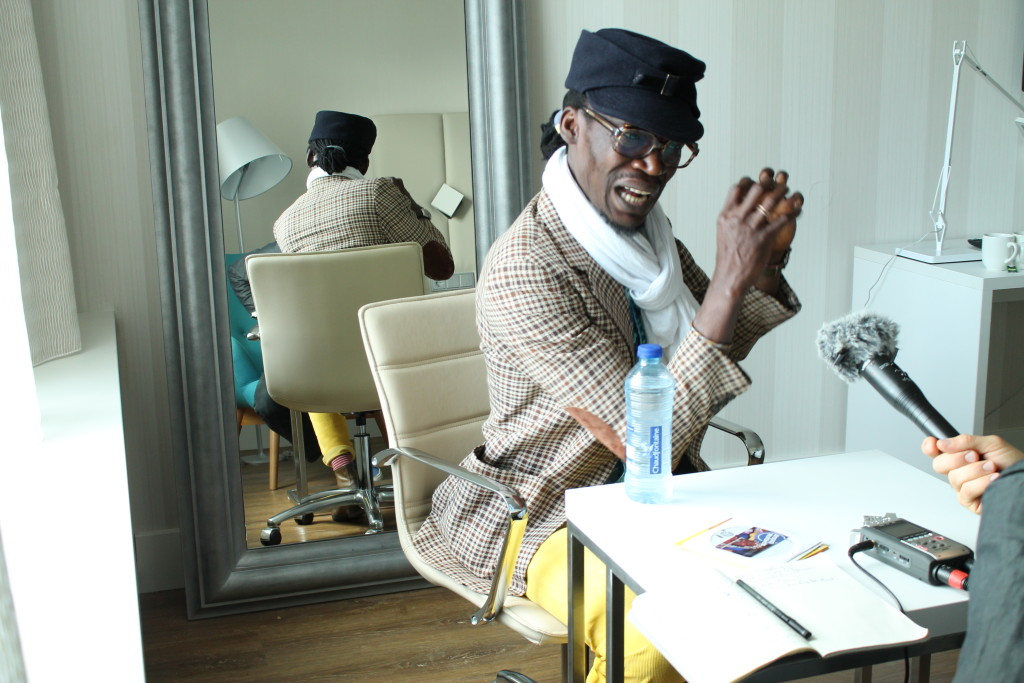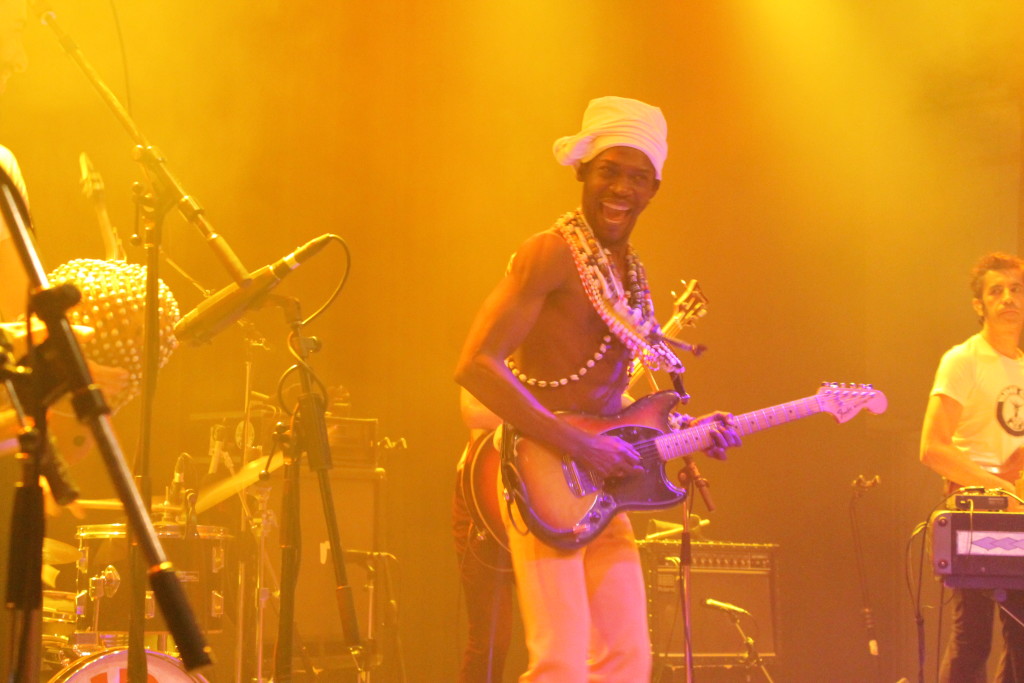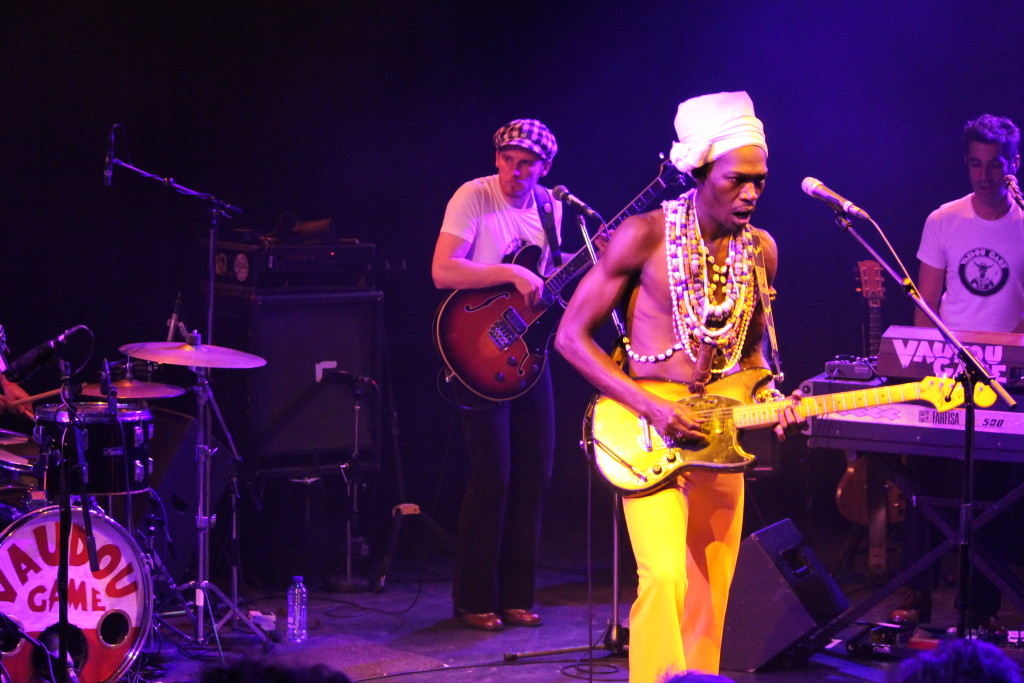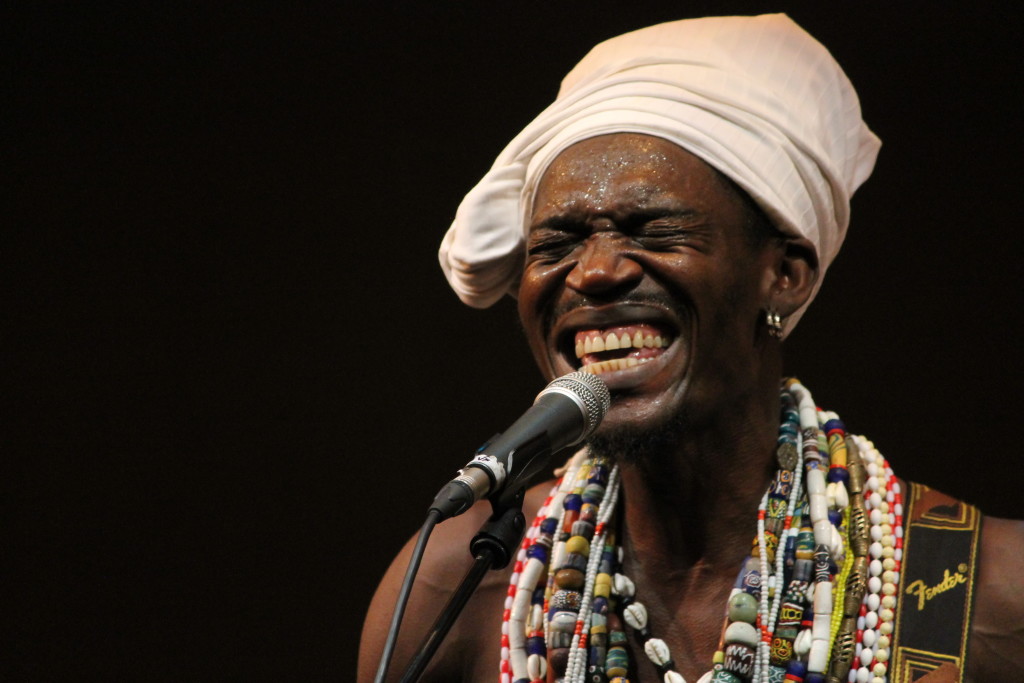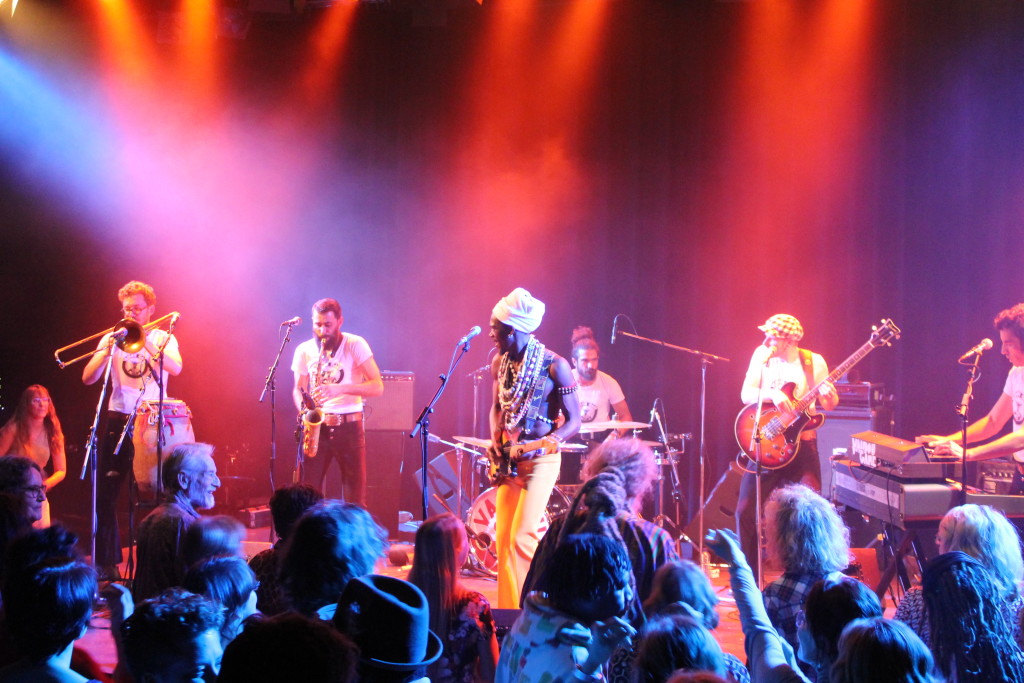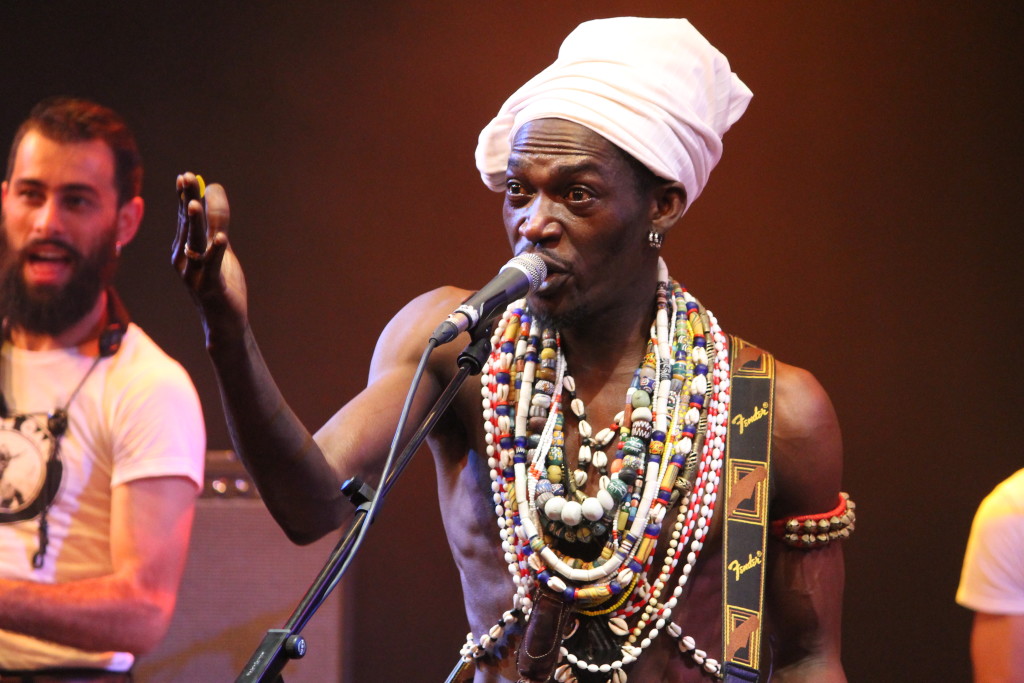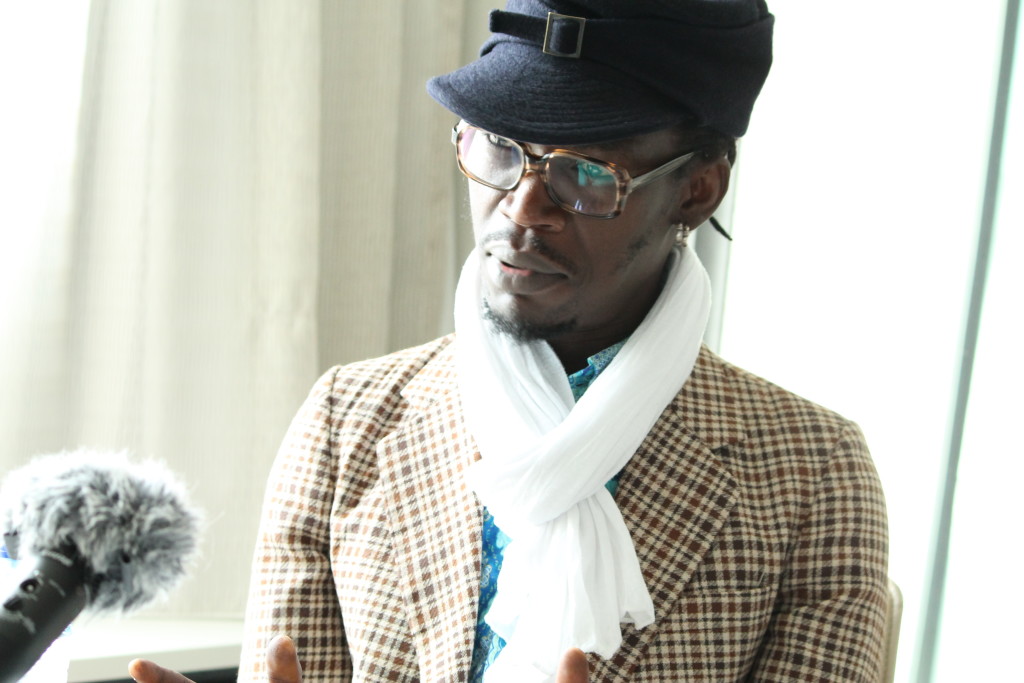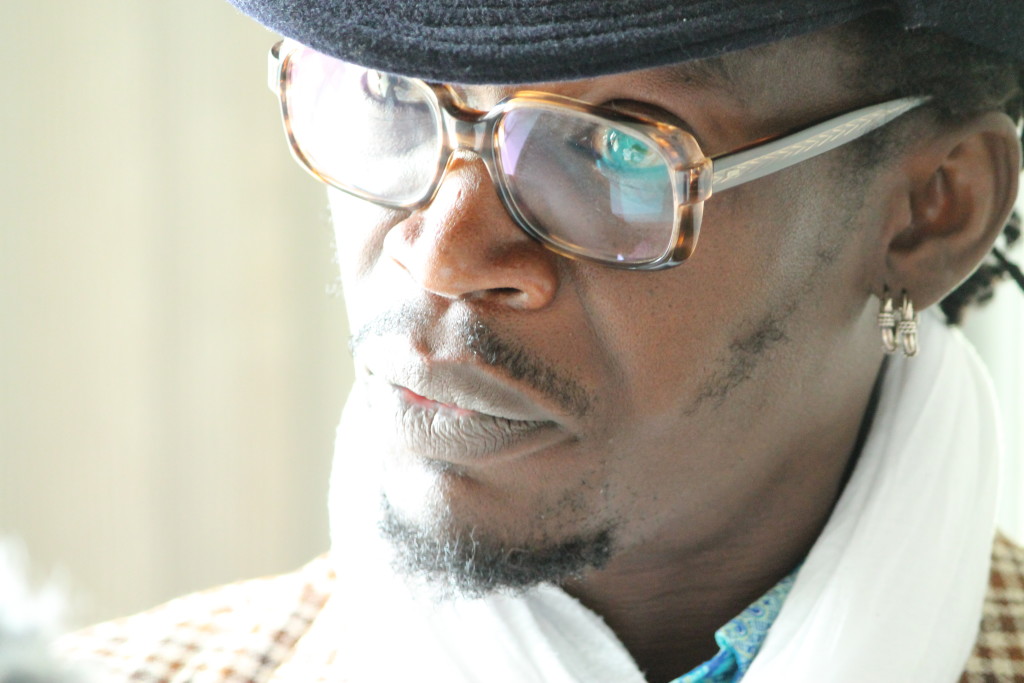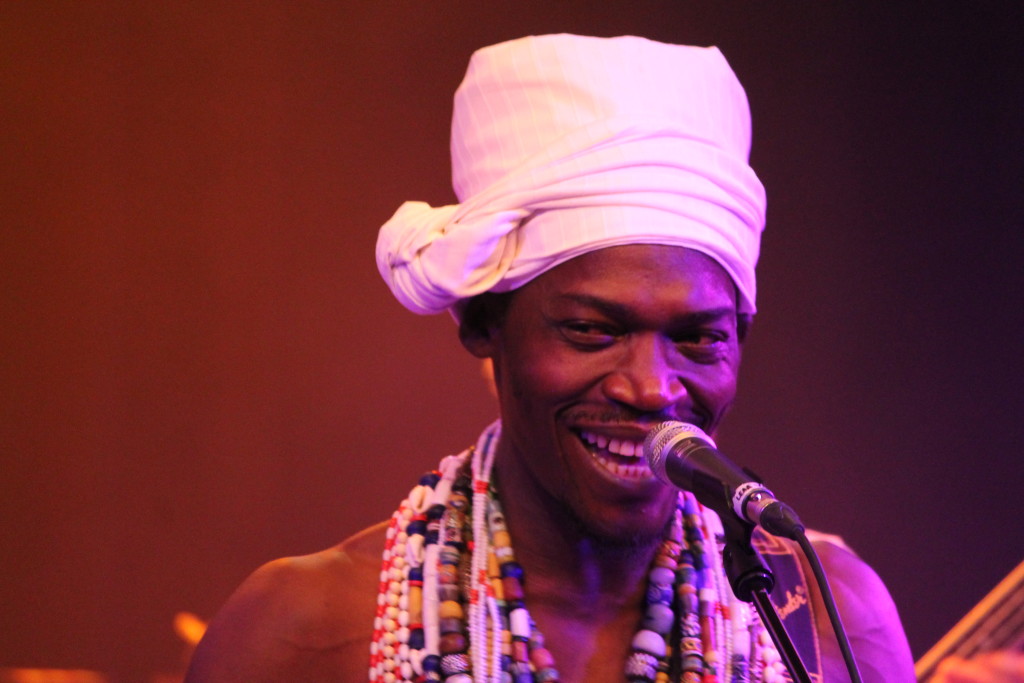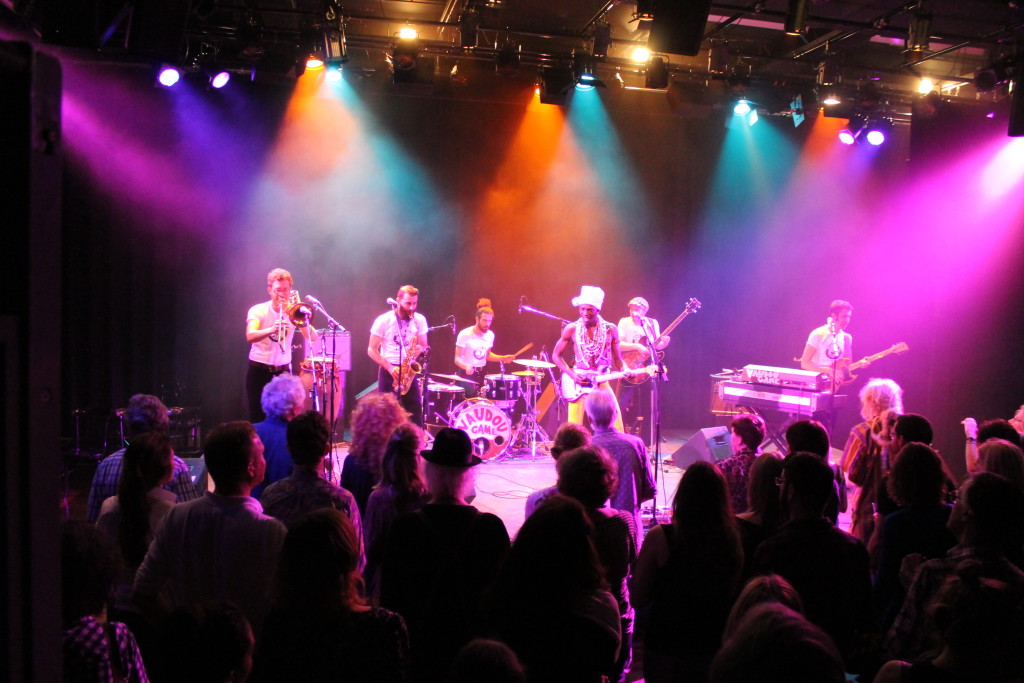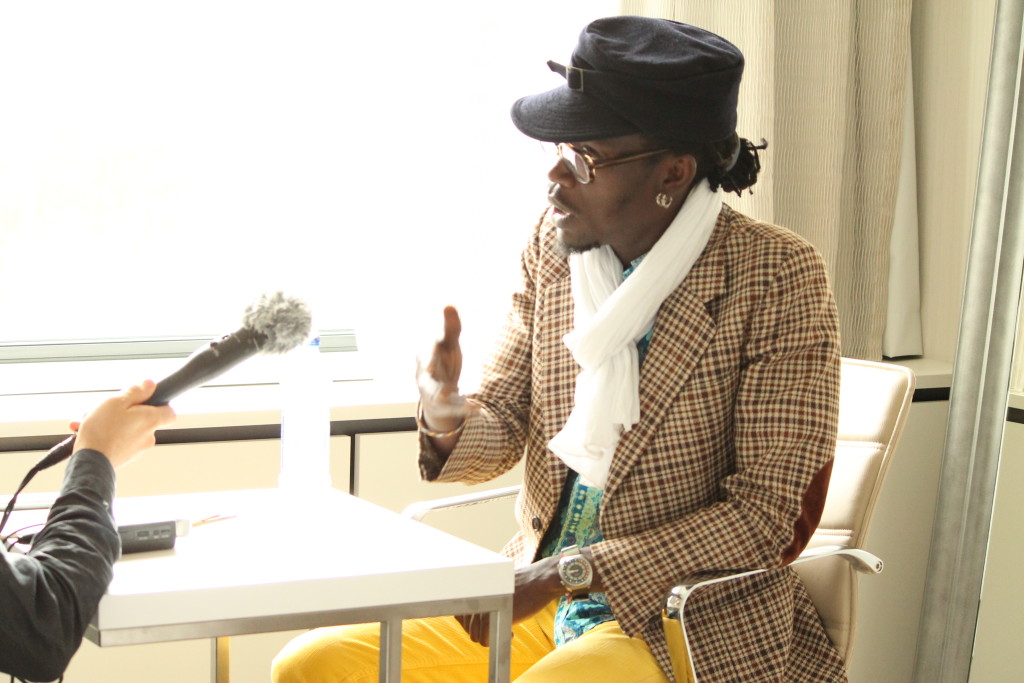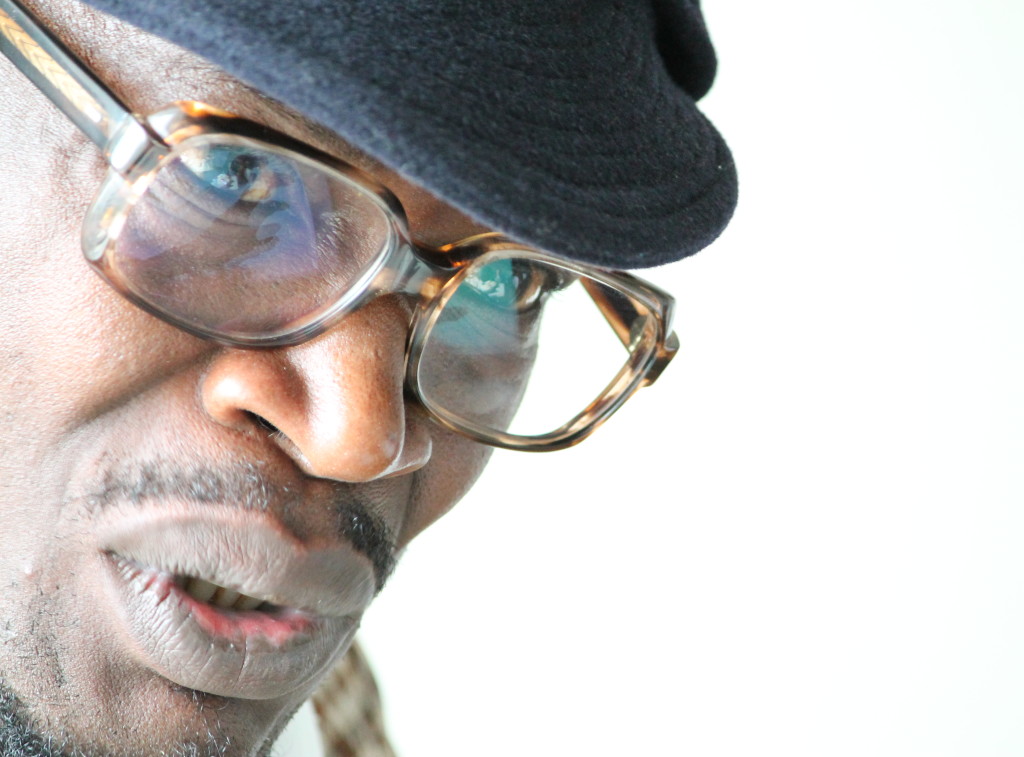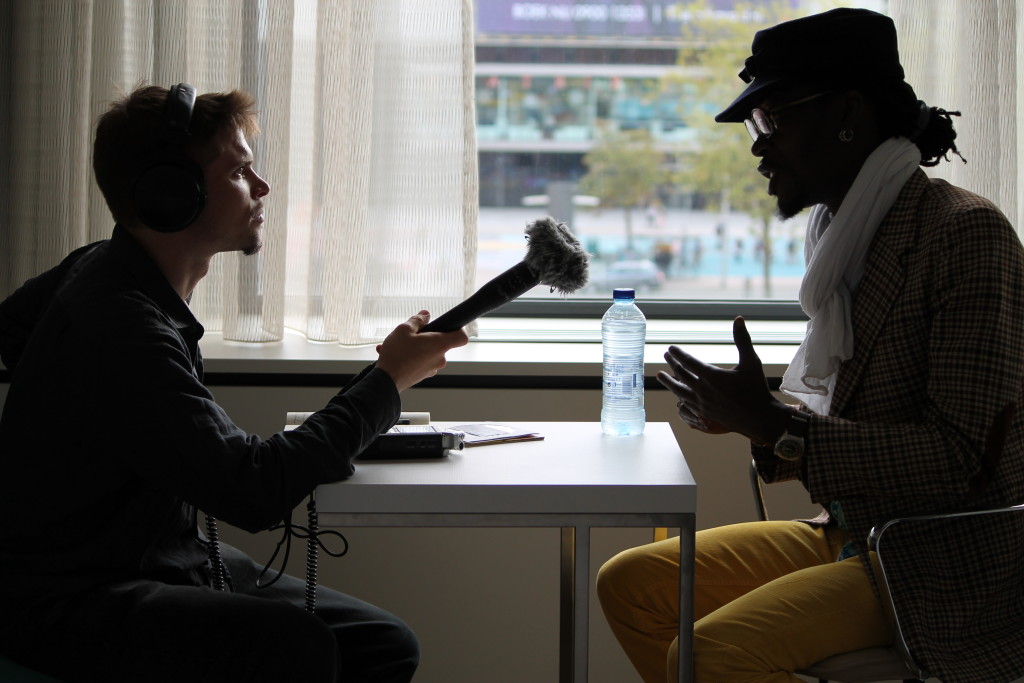One of the highlights of the inaugural Voodoo To Go Festival in Utrecht, Netherlands was Vaudou Game, a tremendous six piece Afro-funk band based in Lyon, France. Led by Togolese vocalist and guitarist Peter Solo, Vaudou Game is taking Europe by storm with its retro, analog Vaudou funk styles. Producer Morgan Greenstreet sat down with Peter before Vaudou Game's set; the conversation ranged from the meaning of Vaudou, to the specific tonalities of Vaudou music, to the reasons why his music works in Europe, but not in Togo.
All photographs by Lollise Mbi.
Morgan Greenstreet: Can you start by introducing yourself?
Peter Solo: Yeah, my name is Peter Solo. Born in Togo, grown in Togo and play music in Togo, before, you know, leaving Togo, went to London for four and a half years. And after London, I live in France now.
Where in France?
I live in Lyon.
How do you find that city?
Cool, cool, nice place, people are…London is very speed, like Paris. Paris is very, very speed, you know, people running. Lyon is a quiet place, and you can, as a musician, you can create like a musician. Musicians have the time to rehearse, to play, for a lot of things. So Lyon is the best place.
And where are you from in Togo?
I’m from Aného, Glidji. The best place, the place where every year you have the ceremony of the La Pierre Sacré [The Sacred Stone], we call it Kpessosso. It’s a ceremony that we do each year at Glidji. We bring out a stone; it is more than just a stone, it’s a fetish. Depending on the color of the stone, if the color of the stone is red or white or blue, it means something. So if the stone comes out and the color is white, that means that this year, we’re going to have good things. There will be abundant rain, there will be harvests, there will be happiness. But if we take a red stone, bad things can happen that year. So every year, we do the ceremony and people go to that Vaudou place and choose the stone. But they never know what color is the stone, so they choose the stone before they know the color.
And were you raised in a Vaudou family, involved in Vaudou?
Yeah, you know, my mom was, she is a Vaudou priestess, and my dad went to the Catholic church, and I have both of them. I have a Catholic background and I have a Vaudou background, but Vaudou is my culture and I was born in it. Even if my dad went to church on Sunday, the rest of the days, Monday to Saturday, he would do the prayer in Vaudou. So you can mix everything, you can go to church, you can stay and practice Vaudou.
Right.
I was born in, you know, Vaudou’s house.
And we’re here in Utrecht, Netherlands for a festival called Voodoo To Go.
Yeah.
For you, is the word “Voodoo” the same as the word “Vaudou” or “Vodun,” and what do these words mean to you?
Vaudou, Vodun… Vaudou is, we call it Vaudou in Togo, but in Benin they say Vodun, but that means the same thing, because Vaudou is born in the Dahomey Kingdom, between Togo and Benin. It was born in that area before, in the 16th century, by way of slavery, Vaudou was taken to the islands like Hiati, Cuba and to Brazil and the United States. Vaudou means consult.
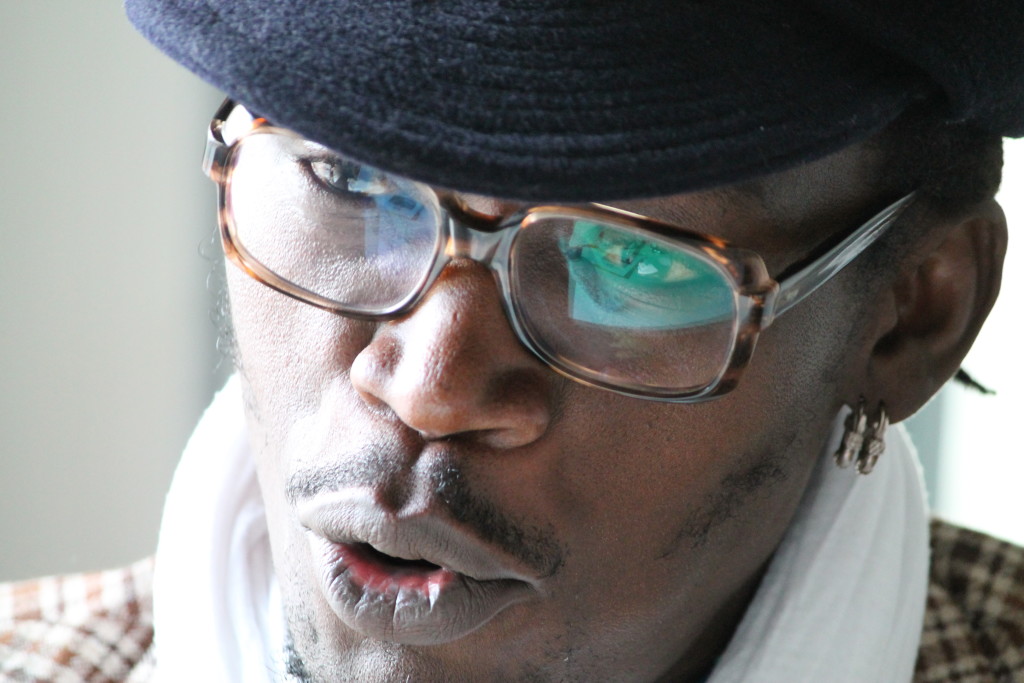
So, to consult what? That is the question!
Yeah, our ancestors say we should consult those elements that were here before us, like the earth, water, fire and air. These elements, for our ancestors, were living, vibrating elements, which is to say: The earth is alive! Water is alive! Fire is alive! Air is alive! The earth, nature, was here before mankind.
Mawu Sogbolisa [the supreme being, God] the one who created the macrocosm that we live in, who created the world, he touched the earth, he touched the air, he touched the water, he touched the fire, to create the macrocosm. So these elements retain his force, it’s not possible that these elements don’t have a bit of his energies.
Our ancestors believe that nature is alive. So, to go towards Mawu Sogbolisa, who people call God, you must go through nature. so, we should consult nature.
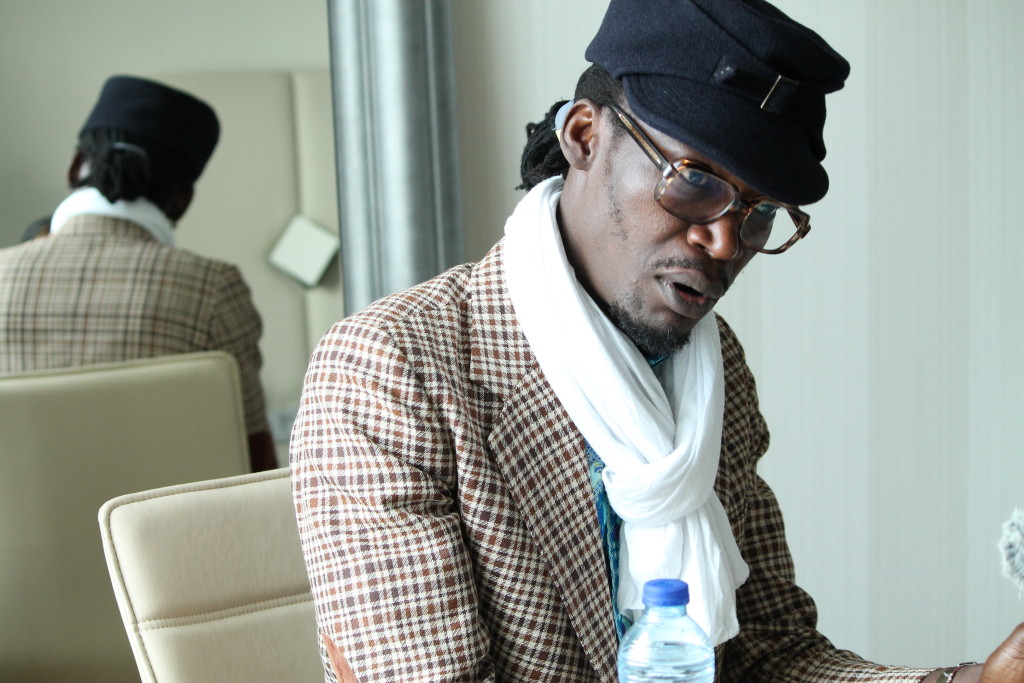
What role does music play in this consultation? Because there is always music at a Vaudou ceremony.
Very important. You know, you can’t do a ceremony, a Vaudou ceremony without music; they are not two things, they are one thing.
Right.
Because music is what makes adepts go into trance. Music is what pushes adepts to have revelations. So, music is very important in Vaudou! Very, very important. There has never been Vaudou without music, those two are together.
Because in Vaudou, we have three dimensions: there is the spiritual dimension; the initiation dimension, how to teach you how to practice Vaudou—because, to take up Vaudou you have to understand certain codes, like if you want to use a computer now, you have to learn something before, you can’t just use it like that. So Vaudou, you need to have some initiation.
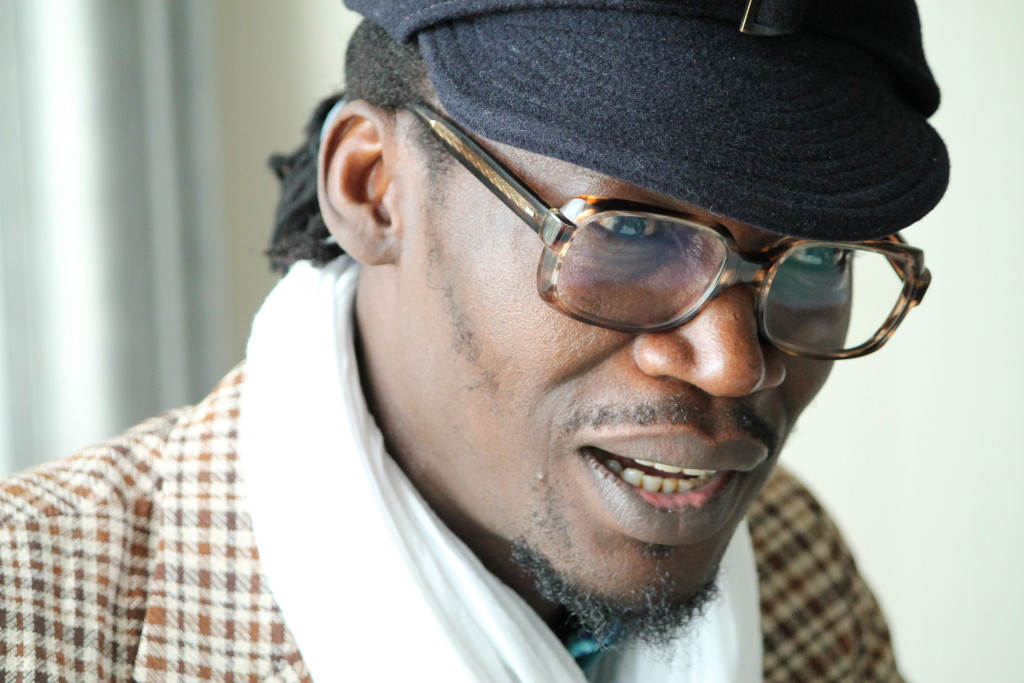
There is also the cultural dimension in Vaudou. Culture is very important! And when I talk about culture in Vaudou, it’s not just music! There’s the art of clothing, how one dresses in Vaudou; there’s the culinary art, what we eat when we are practicing Vaudou, everything that we eat during the ceremonies, what they make us taste, all of that is part of the cultural dimension. Dance, song, everything like that is part of the cultural dimension of Vaudou. So music in Vaudou is undeniable!
Growing up in Aného, were you involved in Vaudou music? In other kinds of music?
I went for other kinds of music; like a musician, I need to be curious. I learned a lot of things. A lot of music that comes from abroad, you know, from the U.S., from Europe. All the musicians there, they want to play something modern. So in Togo you have cultural music, but if you want to do something modern, you need to learn pop, funk or soul, that kind of music, like a musician. So I used to play a lot of music, like a musician, you know, backside, you know, I was a backside…
Backing musician, supporting musician.
Yeah, supporting musician, and I played a lot of music.
On guitar?
On guitar and backing vocal.
Excellent. What do you call the style of music that you play?
I call it Vaudou funk.
Why?
Because Vaudou funk!
[Laughs]
Because Vaudou funk! Because, you know, the energy that comes through that music. You know, funk from ‘70s and '60s that has an analog sound, you know, band, everything is pure, everything is live, everything is energy, everything is spirit. So, that’s why I call it that.
We mix it with Vaudou trance, because the energy that James Brown had on stage, when you see James Brown, he had the music, but he have something, yeah, that we call trance. So if you mix the funk that lived in Africa, went to the U.S., and came back to Africa… Because funk has the energy of fire, that, in Vaudou, we call the divinity Hevioso. With this divinity, there is a rhythm; when we do a ceremony for the divinity Hevioso, when you listen to that rhythm, it’s funk! When you listen to the tradition, how they play traditionally, when you listen to the groove, it’s pure funk, James Brown style! Sometimes I ask myself, maybe James Brown came and took that rhythm, modernized it to become funk! So funk and Vaudou mix very well, so we call it Vaudou funk.
Definitely! There were also some great Beninese and Togolese groups who made music like that in the ‘60s and ‘70s.
Yeah, like Poly-Rythmo [Orchestre Poly-Rythmo de Cotonou], El Rego, Roger Damawazun, yeah, you have a lot.
Growing up, did you hear those recordings?
Yeah! Yeah!
[Laughs] Now, if you go to Togo, does anyone listen to music like that?
No, no. I was born in the ‘70s in Togo, with that kind of music: Poly-Rythmo, El Rego, Roger Damawazun, Sassamasso, James Brown, Otis Redding, Wilson Pickett. When I was growing up, it was that kind of music! But when we were moving on, you cannot do that music…You cannot play funk music in Africa to survive.
Why not?
Because at that time, there was this music, modern music that came, and you know, everyone was listening to it, everywhere. Modern music, but not good music. The people want the music they hear on the radio, they don’t want good analog music, they want something modern, with synths, with sounds that are a little rotten. So…
We’re trying to play music to survive, and when you are playing music to survive, you can’t decide anything, because you need to survive, so you just play what people love. Sometimes you don’t play what you love, you play what people love because you need to survive with music. So that’s what made me play a lot of things, a lot of different kinds of music.
When I went to France, there was “world music” at that time, everywhere, world music, world music, world music, everybody, world music. And so I said, “Hey!” I did one album which was world music, then I said to myself, “No, I didn’t grow up with world music, I grew up with, you know, ‘70s music, Poly-Rythmo and Rego.” Because my father had those on vinyl; he played his records every morning, Afro-funk records, pure and hard. My father was a police commissioner, so he had the means to buy all these records, and he traveled, so he would buy the records that he played at the house.
“Eh,” I said to myself, I said, “I need to go back to the future.” And that’s why Vaudou Game was born. Back to the future and do something ‘70s, analog and modern.
And that’s what you guys are doing, definitely.
Yeah!
When I hear the music that you guys play, it feels like it comes from those times, from the ‘70s. There are some aspects that are different, but the feeling is that it could have been created then. You guys are achieving some success in Europe, people are interested in what you’re doing, and in America too, probably. Hopefully we’ll spread the word further into America…
Yeah, I hope so.
But why do you think that is? How do people receive the music in Europe? When you play in Lyon, how do people receive the music? What’s that like?
You know, Vaudou Game, Vaudou Game is not just music; we are not just playing music. When we are moving—we did a lot of gigs this year, a lot, a lot, a lot—so when we are moving and going from day to day, next day, next day, next day, playing, we are going on a mission, going to preach, going to talk good things about this nature, talk good things about Vaudou, because Vaudou equals nature. Vaudou says that we should be in harmony with this nature, we should respect this nature, because the earth nourishes us, the earth heals us, nature dresses us, it’s thanks to nature that we are here today, you and me; we are beautiful and we are here today, thanks to nature.
Nature can decide tomorrow that you are gone, it’s over for you. So nature is alive, nature is dominant, nature is not just decoration; it’s beautiful, but it’s also living! So when you have a problem, you can go talk with nature, you can go talk with the air you breath. you can talk to the air, it’s not madness, it’s not because you are crazy, non, it’s because you are conscious that the air is alive, the air is dominant, the air was here before you came here, the air will stay here after you’re gone. So it is the elements who are here eternally, you have to be in harmony with them.
So, Vaudou Game, when we are going to play, there is music, but there is also the message. We speak about Vaudou, about nature. And when I speak about nature, I’m not talking about ecology. I’m saying we should speak with nature.
And is this message received in your concerts? People hear you?
Yeah! That’s why Vaudou Game, we are growing up. It’s not just the music—we are doing funk music, I have good, good musicians—but we have a message! We have something to say. We cannot play music today without saying something. You know, look at this world: The world is not so beautiful today; we are afraid, everybody is afraid of something. As artists, we can’t just play music, just put on a show “nya nya nya” and we go, “nya nya nya” and we go, people say “Ah!” No, we should, you know, we need to nourish the soul. Music should touch our soul and the soul of the people who came [to the concert], we should bring something, it should touch people, it should teach. Because we have the opportunity, so we can’t just play like that.
Vaudou Game has music and a message, which is a universal message: I’m not talking about Vaudou from Togo or from Benin, Haiti or from Brazil, or the United States, I’m talking about universal Vaudou, I’m talking about international Vaudou. I’m talking about nature. We have only one nature: Vaudou is here, Vaudou is in the United States, because you have nature there, you have the earth, you have water, you have fire. So one can invoke the fire, invoke the air, invoke those elements and communicate with them.
Why go to a psy [shrink] with you have a problem? You should go in front of the sea, talk to the sea.
[Laughs] Yeah.
You’ll feel good, man! You’ll feel good! I won’t go talk to the psy [shrink]. Those psychiatrists have their problems.
Yeah, it’s true.
I’ll talk to those elements that I know. Those elements can decide my life, save my life. I don’t need glasses to see that! Because people have made us to see nature as something…
Like a spectacle.
Like a spectacle! Because, for them, nature is a material to consume. That’s why they diabolize Vaudou, that’s why they say that Vaudou is something evil, something satanic, something dark, something negative, something to do with dolls, stuff like that. No, that’s all Hollywood, that’s something from a Hollywood film. Vaudou is not something dark! It’s not something negative. Vaudou is love, Vaudou is peace, Vaudou is humble, humility, Vaudou is respect, Vaudou is music, Vaudou is not war, whatever. Because in Vaudou practice, you can go to the church, and do whatever you want to do. In Togo, a lot of people practice Vaudou, and you have all those churches, a lot of churches in Africa. They never made war against this religion, in that area, Togo and Benin. You can see the history.
Oh yeah, definitely. It’s a peaceful coexistence. When you go there, you see the shrines are even in public, and, like you say, people will go to church one day, and the next day…
Go to Vaudou!
If there is a shrine festival, everyone goes to the festival.
Vaudou is not religion. People want to try to say that Vaudou is a religion. Vaudou is not religion! Vaudou is a philosophy, Vaudou is a way of living, Vaudou is a spiritual state. We don’t have a Bible.
Right.
We don’t have somebody who can tell us what to do, what to not do. The only person you have is nature. It’s nature that tells us what to do, what not to do. That’s it. There’s no one else who will tell you what you need to do in Vaudou.
So when you call your group Vaudou Game, how do you think people understand this in Europe? Because I think it’s appealing. And why Game?
“Game” is a play on word, you know. You can say “game” like “play a game,” and you can say “gamme” [tonality, scale] in French.
Which is different.
Gamme, the harmony, the game. For Vaudou Game, the harmony of Vaudou, the identity of Vaudou, the gamme of Vaudou…Because Vaudou Game was born through a harmony, which we worked to identify. Because in Benin and Togo, we don’t have harmonic instruments, so… To speak about Vaudou, you need to find a music of Vaudou. I was seeing American groups, groups coming from other countries, who call their music “voodoo music.”
So when you heard somebody call their music “voodoo music,” what did you think?
I didn’t understand that. Because voodoo, voodoo is not just something…voodoo music…for me it was like a Hollywood film, something like zombies…
Right.
Something negative. “Voodoo music,” no. Vaudou music is peace. When you see Vaudou music on stage, you will see a smile, you will see something positive, you don’t see people who wear dark clothes to go to the cemetery, to do “voodoo music,” satanic music, no, that’s not Vaudou. What is Vaudou music?
[Laugh] I don’t know, that’s what I’m here to find out. I’m here to find out what is Vaudou music. Because there are the traditional songs for the spirits, right?
Songs for the spirits! Those songs we sing when we are in ceremonies, when we are doing sacrifices.
But you can’t bring those songs out and sing them with a band, right?
Yeah, we can’t bring it out, but we try to work in the harmony.
O.K., so use the melodies, the sounds of it.
Yeah, the sound of harmony, we are using it with instruments. Vaudou music, you need to believe in Vaudou before you can make Vaudou music, like that. Without believing in Vaudou… First of all, you need to know what that word, Vaudou, what it means. If you know that word, you can do Vaudou music.
O.K., beyond that… When you’re writing with the band, do you take specific songs, or specific melodies from ceremonies and transform them into songs? Or, as you were saying, is it more of a harmony?
We try to work in harmony, because we have our way, we have a particular way we sing, in Togo, Benin and Ghana. A very, very particular way we sing, a pentatonic way, that we sing. And we don’t have harmonic instruments, like balafon and kora, like Mali and Guinea; they sing in pentatonic and they use that traditional music to follow that pentatonic music. But we in Togo and Benin, we only have our voice, and percussion. If you go to the north, to the south, it’s just percussion, vocal, percussion, vocal, you don’t have any harmonic instrument. But we sing, we have our way to sing, in Togo, everyone can see that.
Yeah, so the thing is, the identity of the music comes from the harmony, that’s what I said to myself. Say if you hear music from Asia, just the instrumental, you can say, “This music, maybe it’s from Korea, or from China or from Japan.” Or if you hear the music from Arabic countries, Algeria, Tunisia, you can say, “Is it music from, you know, Algeria or Tunisia or Morocco?” Just the harmony. So the thing is to find the harmony, to identify Vaudou music, to work hard, to get that harmony, the way we sing, and try to play it with modern instruments, because we don’t have traditional instruments. So we have to detune our instruments and tune them in a different way, before we play, you know, that kind of harmony. So that kind of harmony, we call it harmony of Vaudou, like gamme of Vaudou.
Ah, O.K.
Vaudou Game.
Ah.
So this album Apiafo was based on those harmonies. When you hear the harmony, you think maybe Ethiopian music; no, that’s the harmony from Vaudou music.
Right, so a song like “Ata Calling.”
“Ata Calling,” or “Dangerous Bees,” or “Meva.” That’s the way we sing in Togo.
Yeah, I recognize it.
That’s our way. But before, when we sang like that in Togo, we just played those chords, you know, modern chords, minor and major, and the thing just…doesn’t sound, doesn’t have any particular identity or color. So the work is, how can I sing that way and we can use the modern instruments. We work hard, to find that harmony, so that if I sing the way that we used to sing in Togo, the instruments like saxophone or guitar or bass or keyboard, can play that pentatonic harmony to follow. So that’s Vaudou Game, Vaudou harmony.
So how did you find the musicians that make up the band Vaudou Game? Or did they find you?
Ha, no, I find them. Because I was looking for…I had a band before that have two albums before…
Yeah, I checked it out, Kakarako.
Yeah, Kakarako. So, when I was thinking about Vaudou Game, I was searching for musicians who love funk, not just good musicians. I was searching for people who love funk, people who love analog music, people who love old music, people who love old things; people who don’t love computers, people who don’t love those modern things. A lot of musicians are modern, too modern; their sound is modern.
And I find them, I find them, one by one, one by one. There are those guys who love funk, those guys who love analog music, who love vintage music like ‘60s, ‘70s, who have this spirit also, of music and spirituality, because that’s important. We cannot play music without the spirit. Like Fela say, “If you play with music, you die young, man.” You can’t play with music, music is a spirit. Yeah, [Laughs].
So I find people who know that music is not just—we go play, people dance, “nya nya nya”— No. Music is a weapon. We need to use it for something, for a purpose.
And how did you involve Roger Damawazun in the recording?
He’s my uncle. There were people in Togo who tried to tell me when I was young, “Hey, don’t do modern music, do traditional music, it’s very important. Traditional music!” He did some albums in the ‘70s that were funk, like Wait For Me, and that kind of funk which is very, you know. And when I did my transfer from world music to funk, I said, “Ah, my uncle did that in the ‘70s! And he’s still alive!” And I said to him, “You know, I’m moving to funk, I’m moving to analog funk, Vaudou funk.” And he said, “Yeah, go on!”
So I sent him two songs and he did some featuring on two songs, and that was great! And we bring him here for two years; last year he was here, and this year he was also here.
Nice. So he recorded here with you, or...?
He recorded in Togo.
You sent him the finished track?
I sent him the finished track, he recorded there, we put it to the band and everything was mixing.
It sounds great!
Man, without a computer, we don’t have a computer, we don’t…
You did it with analog tape.
Analog everything; analog tape with 15 tracks.
What’s interesting to me, is that there are many bands in, say, New York or London, who are really interested in Orchestre Poly-Rythmo or in Fela’s music and trying to make that sound exactly, but you don’t see many groups that are actually led by Africans. You’re doing Vaudou funk from Togo, you’re from Togo, you have more of a connection to that…Do you have any reflections on that?
Yeah! Hmmm. It’s not easy. It’s not easy, because you know, I was seeing that from far away, like Budos…
Budos band.
Budos and what do you call them? Those things from Daptone.
Antibalas.
Yeah, Antibalas, you know, the Daptone team. And I would see that and say, “Hey! Those guys are doing Afro music and those things, and me, I’m here trying to find myself and trying to do whatever.” I would say “Eh!” Those things that you think.
But it’s good, it’s positive. Positive, because you don’t need to be African or be black to do black music, if you feel it, you do it. They are musicians, they are good musicians, they do their own thing. So, they are aware, they are open minded, maybe before us, and they, you know, take the things first and they are doing it, but you know, positive, positive, positive…
For the most part…
Positive! I can’t say something negative about that, it is a good guy who tries to do that, who loves African music, and loves good African music, not just African music like that, who loves good African music.
Right.
So, guys like that are doing things seriously. They are the ones who went to Africa first, to take that vinyl and reissue all those things, tons of DJs traveled all over there [Africa] searching for records, old records and making reissues here [in Europe]. They are open-minded and they opened our eyes a bit, to say, “Ah, we have that here, I have that, I grew up with that a bit. Why do I run around, trying to do other things? Maybe I can…” So, all that is positive.
Right. There’s interest in vintage African music in Europe and the United States; Analog Africa put out all those great compilations of Afro-funk, you know, a lot of people reissued Fela, everything that’s been happening around that. So in a way it made the space for a group like Vaudou Game to exist.
Hmmm.
It’s interesting and a little sad to me that interest exists here in Europe and in New York a little bit, but if you go Benin...well, Benin is a little different, but if you go to Togo or Ghana, you won’t hear that music.
No, you won’t hear that music anymore, because Togo music doesn’t…We don’t have any Togo music. That’s why Vaudou Game was born, because I was thinking about those things. We don’t have Togo music, but we have something there in Togo that everybody knows. We have something in Togo, which is better that gold, diamonds, petrol…Everybody knows that…It’s Vaudou.
Everyone in the world knows this Vaudou, but the music of Vaudou, or the identity, no one knows. So that’s what we’re working on, so that people can come to know Vaudou, know the music of Togo, Vaudou music. So, today, we can say that Vaudou Game is starting, slowly to become something, to represent the music of Togo, the music of Vaudou. And we are very proud, I am very proud to represent that, to talk about Vaudou, to represent Vaudou. Very proud! Because it’s my culture, I don’t have any other culture, I know than that. If I am not proud of my culture, how can I be good with you? I can’t be good with you, I would feel strange in my body; I need to be good with myself before I can be good with other people.
So I am very proud of Vaudou, and I hope that with the work that Vaudou Game is doing, you know, people are going to hear about Vaudou Game and Vaudou music and Togo music and Benin music also.
In Togo as well…
In Togo!
I hope they’ll hear about you there.
They start to hear about that! Because, you know sometimes, if you are doing that music in Togo, people don’t understand: You need to do it outside Togo. And if they see people are following outside Togo, they say “Ah, that thing, we have it here and we don’t care about it, and he’s doing there, and people are, even white people are, ‘Ah, Vaudou, Vaudou, Vaudou'…” Sometime our brothers don’t know a lot of things about Vaudou, but when they see that white people and people from another place talk about Vaudou and are proud of Vaudou, they can, you know, change their mind and say that, “Ah, this is my thing.” And they can be proud and change their point of view, their way of seeing things, and follow.
Here we are, we’re in Utrecht for the Voodoo To Go Festival. How do you feel?
I feel good! I feel happy! Leopold is my brother, so we are doing our things. This is my thing, so it’s not like a festival we are doing, this is my thing, I’m at home, so we need to do it good! We are talking about our culture here.
It’s not just a festival, Voodoo To Go; We’re talking about our culture, the way we live. We need to show people who don’t know Vaudou, who don’t know Togo, that this is our way, the way we live, the way we practice, that this is our way, this is our Vaudou. So, for me, I’m very, very proud to be part of this. I couldn’t miss this! Never! So I am very happy to be here with my guys, to support and bring our culture. Wherever they talk about Vaudou, the real Vaudou, I will always be there! I’m there!
Great! So we’ll see you next in New York!
Next year, yeah. We are working on it.
Nice. Be in touch, Afropop will help to spread the word.








